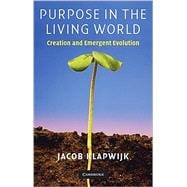
Note: Supplemental materials are not guaranteed with Rental or Used book purchases.
Purchase Benefits
What is included with this book?
| List of figures | p. viii |
| Preface | p. ix |
| Introduction | p. 1 |
| Does life on earth have a purpose? | p. 4 |
| A quest for meaning | p. 4 |
| Planned approach | p. 7 |
| Creationism, Intelligent Design, and Augustine's idea of time | p. 9 |
| Creation and creationism | p. 9 |
| Life based on an intelligent design? | p. 12 |
| A bridge between science and faith? | p. 20 |
| Creation stories and their practical intent | p. 28 |
| Augustine: time is a creature of God | p. 32 |
| Darwin, neo-Darwinism, and the naturalistic continuity claim | p. 37 |
| Darwin's theory of evolution: the CVST algorithm | p. 37 |
| Evolution theory and evolutionism | p. 41 |
| The ambiguity of naturalism | p. 44 |
| Continuity and reducibility? | p. 46 |
| Miller's pre-biotic broth and the premises of evolutionism | p. 53 |
| Origin of life: a category mistake | p. 53 |
| Survival of the fittest: a tautology | p. 59 |
| Evolution of science: a performative contradiction | p. 65 |
| A cold shudder along Darwin's back | p. 71 |
| The durability of biological species | p. 73 |
| Gradualism and punctuated equilibria | p. 75 |
| The ancient lithographic bird | p. 77 |
| God, time, and taxonomy | p. 84 |
| The emergence theory of Morgan and Alexander | p. 90 |
| Emergence according to Morgan and Alexander | p. 91 |
| The intentionality of human consciousness | p. 94 |
| Metaphysics and the standpoint of experience | p. 97 |
| Luctor et emergo: what is emergent evolution? | p. 103 |
| Mozart and "Twinkle, Twinkle, Little Star" | p. 103 |
| Organizational levels in nature | p. 106 |
| Entities and modalities | p. 115 |
| Supervenience, correlation, and idionomy | p. 118 |
| Chimpanzees and the HIV virus | p. 125 |
| Michael Behe and his mousetrap | p. 128 |
| Toward a general theory of emergent evolution | p. 139 |
| John Searle and the mystery of consciousness | p. 140 |
| Peter Checkland and the structures of society | p. 146 |
| Ontological stratification | p. 153 |
| Hominization and the philosophy of mind | p. 160 |
| Emergent evolution as a conceptual scheme | p. 160 |
| The human person and the mask | p. 164 |
| The anthropic principle | p. 172 |
| Biological constants? Conway Morris | p. 176 |
| Methodological naturalism | p. 181 |
| The problem of David Chalmers | p. 185 |
| Augustinian faith and evolutionary science | p. 191 |
| The creation account and the story of becoming | p. 191 |
| Fides quaerit intellectum: a hermeneuric horizon | p. 195 |
| Pakicetus, the swimming ungulate | p. 203 |
| Personal experiences | p. 208 |
| The organism is a whole. The world is a habitat | p. 211 |
| J.C. Smuts, holism, and evolution | p. 212 |
| Enzymes, neurons, and emotions | p. 213 |
| The life-world | p. 220 |
| From biosphere to noosphere | p. 225 |
| New Age and Brahman | p. 230 |
| The slumbering temptation of essentialism | p. 234 |
| Is there a creation order? Herman Dooyeweerd | p. 235 |
| The standpoint of experience and metaphysics | p. 239 |
| The reflective-empirical method | p. 242 |
| The reflective-empirical method and living nature | p. 246 |
| Type laws: an essentialist error | p. 248 |
| Escaping essentialism | p. 254 |
| Questions surrounding the emergence process | p. 259 |
| Hidden configurations in nature: prions | p. 259 |
| John Paul II on the evolution problem | p. 264 |
| Ontological profile and evolutionary process: Neanderthals | p. 268 |
| The last great narrative | p. 272 |
| Enkapsis in nature. Is there an Omega point? | p. 275 |
| Self-subordination in Baja California | p. 276 |
| "Desert storm" and other miracles | p. 278 |
| The kingdom of God as final stage? Teilhard and Laszlo | p. 281 |
| Human experiences are ambiguous | p. 287 |
| Bibliography | p. 293 |
| Index | p. 304 |
| Table of Contents provided by Ingram. All Rights Reserved. |
The New copy of this book will include any supplemental materials advertised. Please check the title of the book to determine if it should include any access cards, study guides, lab manuals, CDs, etc.
The Used, Rental and eBook copies of this book are not guaranteed to include any supplemental materials. Typically, only the book itself is included. This is true even if the title states it includes any access cards, study guides, lab manuals, CDs, etc.